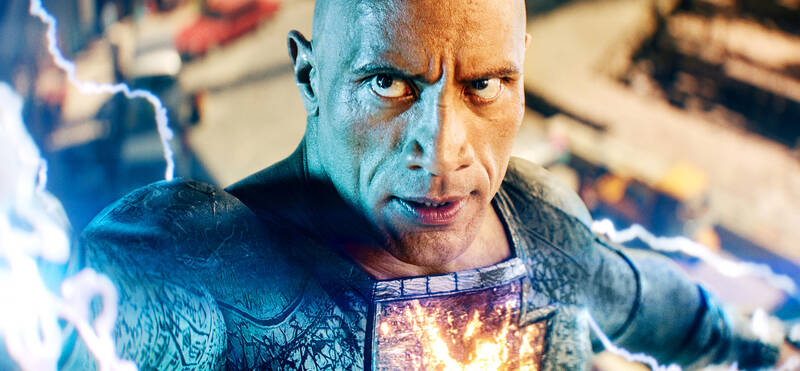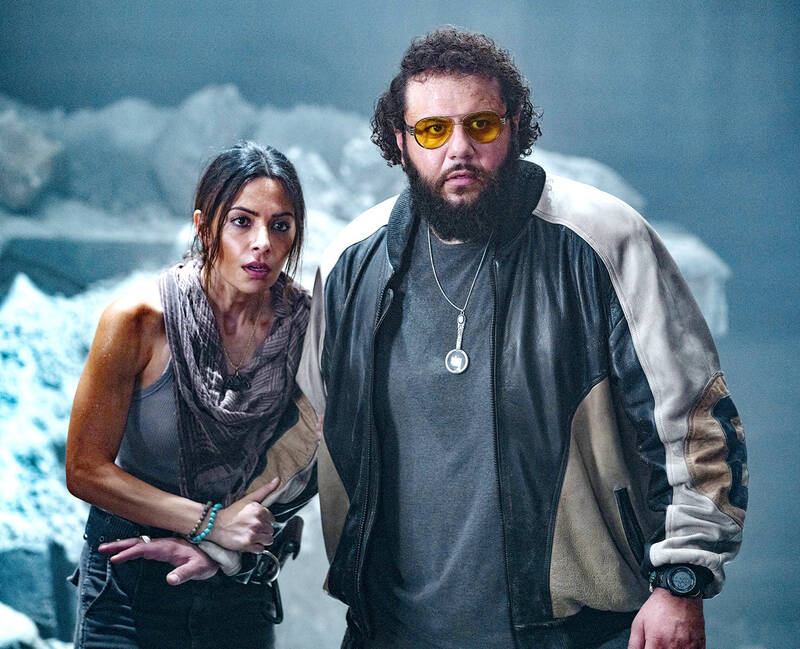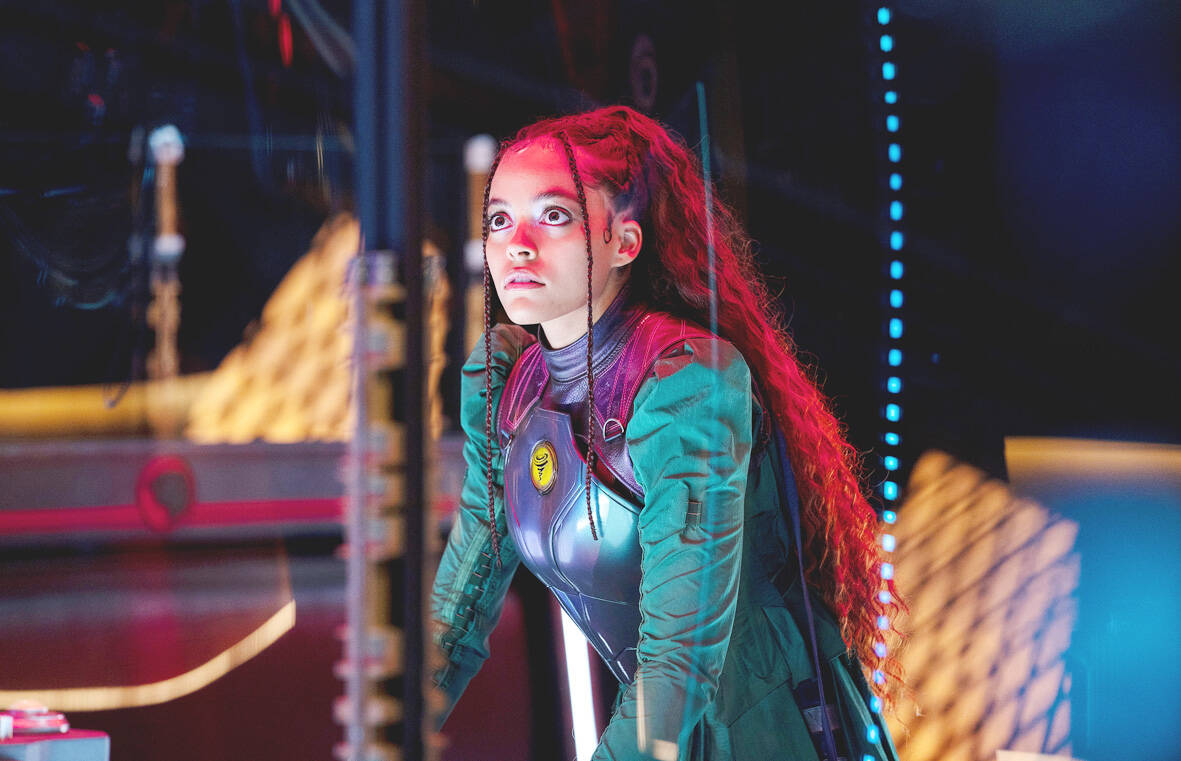Not long into Black Adam, a preteen boy looks up at the muscled hulk of Dwayne Johnson and begs for his help: “We could use a superhero right now.” Speak for yourself, kid.
Do we need another superhero with another convoluted origin story that stretches back thousands of years and fulfills a whacko destiny? Do we really need another clutch of secondary level heroes to muddy focus? We’re almost 40 deep into the Marvel Cinematic Universe and a dozen in the DC universe. You can almost smell the fumes now, can’t you?
Black Adam isn’t bad, it’s just predictable and color-by-numbers, stealing from other films like an intellectual property super-villain. But Johnson is a natural in the title role, mixing might with humor and able to deliver those necessary wooden lines. Why he hasn’t had a starring role in a DC or Marvel superhero flick until now is astonishing — c’mon, he’s built himself into a freaking superhero in street clothes already.

Photo: AP
Like Marvel’s Eternals, Black Adam gets out of the blocks very sluggishly with the tangled tale of our setting — Kahndaq, a fictional Middle Eastern kingdom in 2,600 BC that has wizards, a blood-thirsty king, a magical crown and Eternium, a rare metallic ore with energy-manipulating properties (Hello, Vibranium from Black Panther).
Flash-forward to present day, where Kahndaq is under the cruel rule of the organized crime syndicate Intergang and its citizens are ripe to rebel. They think they may have a leader in Black Adam (here Teth Adam, when he is introduced), who is released from his 5,000-year-long tomb and is naturally cranky. Is he a force for good or bad? (Or for a new sub-franchise?) The answer is yes to all.
Yet the other superheroes in the DC pantheon aren’t sure about the new guy and send what can only be described as the Plan B of muscle from leftover members of a knock-off organization called the Justice Society of America.

Photo: AP
There’s Doctor Fate (a dollar-store Doctor Strange played by Pierce Brosnan, who somehow keeps his dignity), Atom Smasher (Noah Centineo, nicely playing a dweeby and always hungry giant), Aldis Hodge as a one-note Hawkman and Quintessa Swindell as Cyclone, who can control — checks notes — the wind. They apparently left at home the superhero with the ability to open jars.
Black Adam is more than a match for all of them combined. He can fly, move as fast as The Flash, catch rockets, deflect bullets and harness his own bluish electricity. Mostly he does this weirdly passive thing of just floating. “I kneel before no one” he intones, which might explain it.
Director Jaume Collet-Serra and the design team do a great job in every department but are let down by a derivative and baggy screenplay by Adam Sztykiel, Rory Haines and Sohrab Noshirvani that goes from one violent scene to another like a video game in order to paper over a plot both undercooked and overcooked. At one point, with the audience exhausted by all the carnage, they introduce skeletons who rise up as a legion from hell, just what we wanted.

Photo: AP
They nicely include pockets of humor that DC has not always done well — a recurring bit with Baby Come Back and teaching Black Adam satire are fun; a Clint Eastwood gag fails — and there may have been three natural endings piling up before the final, manipulative one. (“This can only end one way,” says the script. Don’t believe it.)
Amidst the punching superheroes are two humans — a rebel leader and her skateboard-and-comics-loving pre-teen son, played superbly by Sarah Shahi and Bodhi Sabongui, respectively. Comedian Mohammed Amer is a much-needed bolt of bright humor.
Most intriguing — and the angle most fruitful to lean into — is the notion of hero itself. The Justice Society members are shocked to find that they aren’t seen as heroic to the residents of Kahndaq, living 27 years under oppression. Black Adam has come to help, even if he’s a little more violent. Residents wonder where were the guys with all the superpowers for almost three decades while they suffered — a nice dig at Western nations.
“There are only heroes and villains. Heroes don’t kill people,” a confused Hawkman states. Black Adam replies: “Well, I do.” It is Shahiby’s character who notes that it’s easy to call someone a hero when you’re the one drawing the line.
The number of — ahem — call-backs to other films is pretty sad — Tomb Raider, Back to the Future and plenty of Star Wars (even, unforgivably, the line “You’re our only hope.”) It’s a film that is sometimes self-aware, as when the kid urges Black Adam to come up with a catchphrase that will sell lunchboxes.
He does, but it makes little sense: “Tell them, ‘The man in black sent you.’” Wait, he was sent by someone else? Do they mean Johnny Cash? Actually that may be a clue. What the filmmakers probably had in mind was cash — selling those lunchboxes.

Climate change, political headwinds and diverging market dynamics around the world have pushed coffee prices to fresh records, jacking up the cost of your everyday brew or a barista’s signature macchiato. While the current hot streak may calm down in the coming months, experts and industry insiders expect volatility will remain the watchword, giving little visibility for producers — two-thirds of whom farm parcels of less than one hectare. METEORIC RISE The price of arabica beans listed in New York surged by 90 percent last year, smashing on Dec. 10 a record dating from 1977 — US$3.48 per pound. Robusta prices have

A dozen excited 10-year-olds are bouncing in their chairs. The small classroom’s walls are lined with racks of wetsuits and water equipment, and decorated with posters of turtles. But the students’ eyes are trained on their teacher, Tseng Ching-ming, describing the currents and sea conditions at nearby Banana Bay, where they’ll soon be going. “Today you have one mission: to take off your equipment and float in the water,” he says. Some of the kids grin, nervously. They don’t know it, but the students from Kenting-Eluan elementary school on Taiwan’s southernmost point, are rare among their peers and predecessors. Despite most of

The resignation of Taiwan People’s Party (TPP) co-founder Ko Wen-je (柯文哲) as party chair on Jan. 1 has led to an interesting battle between two leading party figures, Huang Kuo-chang (黃國昌) and Tsai Pi-ru (蔡壁如). For years the party has been a one-man show, but with Ko being held incommunicado while on trial for corruption, the new chair’s leadership could be make or break for the young party. Not only are the two very different in style, their backgrounds are very different. Tsai is a co-founder of the TPP and has been with Ko from the very beginning. Huang has

A few years ago, getting a visa to visit China was a “ball ache,” says Kate Murray. The Australian was going for a four-day trade show, but the visa required a formal invitation from the organizers and what felt like “a thousand forms.” “They wanted so many details about your life and personal life,” she tells the Guardian. “The paperwork was bonkers.” But were she to go back again now, Murray could just jump on the plane. Australians are among citizens of almost 40 countries for which China now waives visas for business, tourism or family visits for up to four weeks. It’s